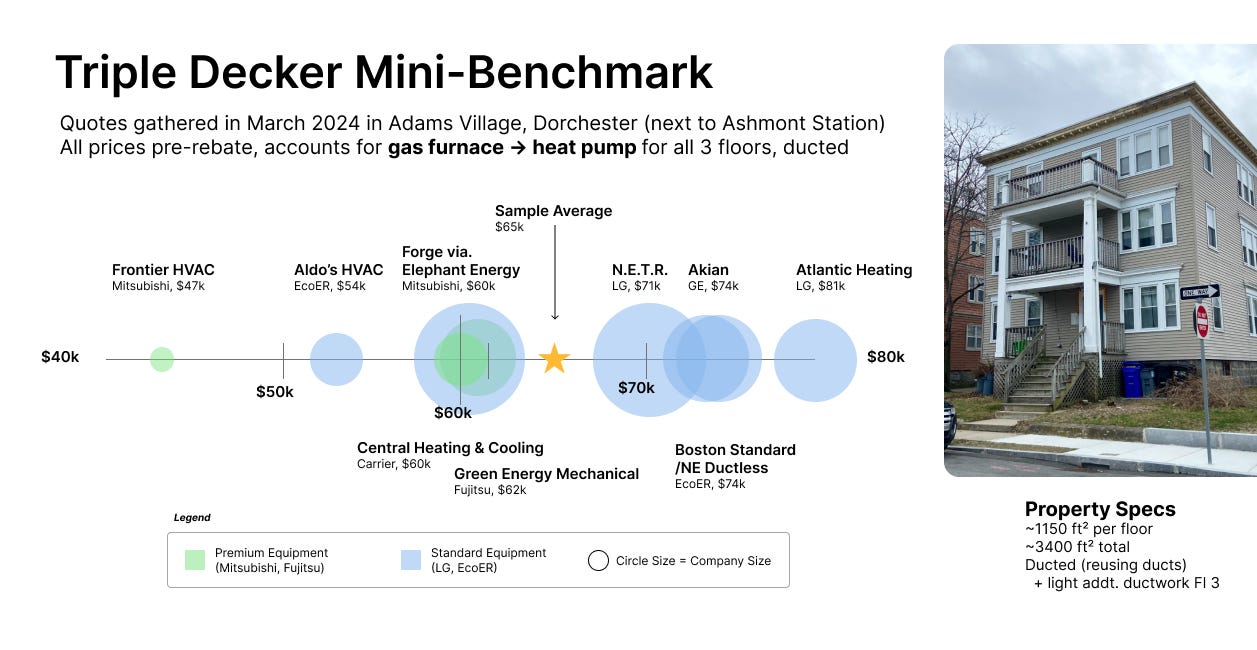HVAC Contractors but If They Were Cars
A guide to the contractors you'll meet, and how we vet them
Summary
We propose 3 contractor classes: premium, standard, indie
Premium is like buying a luxury car. Do you need it? No. Overpriced, maybe.
Standard is like buying a Toyota. Reliable, fairly priced, best value for money.
Indie is like buying a used car. Could it work? Yes, and it’s fantastic for the budget. But you need to know what you’re looking for, and you’ll want to be rigorous in checking quality.
Equipment: we highly recommend inverter (rather than single-staged) heat pumps, especially for the standard & indie tiers.
This memo walks you through how we think about these contractors, and how you may want to approach conversations with these contractors yourself.
But first..
Our Market Right now
We think the market for heat pump installations right now is a bit like cars in 1908. Cars existed before the Ford Model T, but they were expensive. Then the Ford Model T comes along, and makes a durable, reliable, & affordable model for the masses. Car adoption skyrockets.
After Sila bought out every other HVAC contractor in town and raised their prices, we believe there’s an opening in the market for a Toyota/Honda/Ford-Model-T-tier of contractors. We believe that they’re poised to succeed if we structure the market right in the coming years.
Premium (Overpriced?) Contractors


(The Range Rover, btw.)
Profile: BIG contractors that typically employ 8+ crews, may be owned by PE.
Benefits: same day service if any problem comes up, big crew comes out to install.
Downsides: $$$. If it’s PE owned - are the best technicians still there?
It’s like buying a luxury car. Except in HVAC, it may be hit-or-miss.
Owned private equity? I think you can get a better deal. There are stories of good technicians leaving contracting companies if new management pushes a sales-at-all-cost culture (not always the case, but it happens).
Independently owned? If you’re getting a good off-season (January through late April) deal on it, then it may be a fair opportunity. Good deals come up every now and then during the off-season.
Salespeople in this category typically get paid ~10% commission, and overhead/coordination costs are significantly higher. They may get pushy1.
PE-backed companies benefit from wholesale equipment rates, but are unlikely to pass it onto consumers due to mandatory profit margins/returns to investors.
During the off-season, we also observed that a lot of these larger contractors tend to offer non-Mitsubishi equipment to (1) attempt to be competitive on pricing, while (2) maintaining high profit margins:
We don’t think this tier of contractors will grow that much in the coming years as equipment prices continue to rise, & consumer budgets get squeezed. Rather, it’ll be the standard and indie tiers that will drive growth in the market.
Questions to ask:
Who owns this contracting company? Did it get bought out by Sila?
Do I really need this duct cleaning/add-on/extended labor warranty?
This is too expensive, and I’m going to go with this other quote unless you are willing to match it.
What is your profit margin?
Standard Contractors

Profile: mid-sized contracting operation with 10 to 50 people, anywhere from 3 to 7 crews, owner-led, good mix of seasoned veteran techs & newer techs to help.
Benefits: even overhead, fair prices, best techs still at company & leading crews.
Risks: fairly low risk if you check references, I think?
Like buying a Toyota or Honda. In this case, a Honda CRV. Reliable, and affordable. This is where we typically like to strike bulk deals. The biggest challenge is vetting for quality.
Contractors in this category likely already has a portfolio of previous installations that you can call for references. And you should call those references. I also like how you can ask the owner or person working with you about the crew leads, particularly if you’re talking to the owner, who probably has been doing installations personally until they decided to hire those crew leads.
Questions to ask:
How many people do you have on your crew, and how long have they been there?
How long have you been in business?
Can you give me some references?
Can you guarantee that you’re pulling the right permits?
Can you show me the Manual J calculation?
Indie/Budget Contractors
Profile: smaller contracting operation with 5 to 6 people, approximately 2 crews & either the owner or someone else handling admin & scheduling.
Benefits: really efficient operations, low overhead, lower cost.
Risks: potentially hit/miss on quality & project management.
Going with these contractors is like buying a certified used car, except there’s nobody to really certify them. You’ll have to check for the quality yourself.
Here’s a few ways how you can do it:
One form of this is a personal referral/recommendation. Take a look at prior work.
Another form of this guaranteeing that proper permits & inspections are pulled.
We’re publishing our quality indicators. You can reference that if it helps!
Note how thorough the walkthrough is. Sometimes it’s super quick; a lot of smaller contractors eyeball the walkthrough. You’ll want to ask them plenty of questions during it
Some of these contractors truly prefer to stay small & lean, and take pride in their work. We categorize these contractors as boutique contractors.
Others may be just getting started, or don’t have that much experience in the industry. You’ll want to be rigorous in checking references.
Unlike larger contractors, the people walking through your house may actually be doing the installation. So ask all the technical questions you can!
Questions to ask:
How long have you been installing heat pumps?
How many heat pumps have you installed?
Can you give me a couple of references I can call?
How do you select your equipment? With software? Something else?
Can you guarantee that you’re pulling the right permits?
Can you show me the Manual J calculation?
How much does equipment factor into this?
You may have noticed that we have spent a lot of time talking about quality. We wrote an entire guide on how we vet contractors for bulk deals, and you can use that if you’d like.
For equipment in particular, use an inverter (aka variable speed) heat pump, as opposed to a single-stage heat pump!! This is the single most useful thing you can do to have some safety margin when it comes to preventing oversizing/undersizing, because variable speed systems can ramp up or down to adjust for the required heating & cooling load.
Is it better to get Mitsubishi equipment with an indie installer, or budget equipment with a luxury installer?
Premium equipment raises the ceiling for good installations, but bad installation quality lowers the floor. I think your options are
Just go with a vetted standard installer & you won’t even have this problem
Indie installer if they come with recommendations + promise to pull permits & complete inspections + have years of experience or have installed hundreds of heat pumps before
Luxury installer with budget equipment if you cannot verify any of those things
Conclusion
We believe standard tier contractors are probably the best bet if you want to get it done relatively quickly.
If you have the time to dive deep into the research & vet every installer, going with an indie installer may save you money.
If you can get a sweet deal from a premium installer during the off-season, it’s worth considering.
We think the key to achieving Mass Save policy goals in the coming years is to enforce quality standards in the market, so that standard & indie-tier contractors can flourish.
You have to be careful out there, Kit. You don’t want to just go with some unlicensed contractor who’s just 2 guys & a truck, who may not even be in business in a few years. You’re paying more, but you’re paying for quality.
However.. of them don’t really get into any tangible metrics when you press them on what quality actually means, particularly if these salespeople never had service/installation experience before.
There are exceptions; every once in a while you’ll get a Brian Sommers who knows all the engineering details, and are excellent at their jobs. Brian, I salute you.
They have a point, to be honest. If you buy a used car, you can end up with a lemon. But I’m not going to tell you to not buy a used car. You just need to know how to vet for quality, which I’ll explain in the “Indie/budget contractors” section.










As someone pursuing a partial home rebate in a multi-unit building in Boston, this website and information is fantastic.